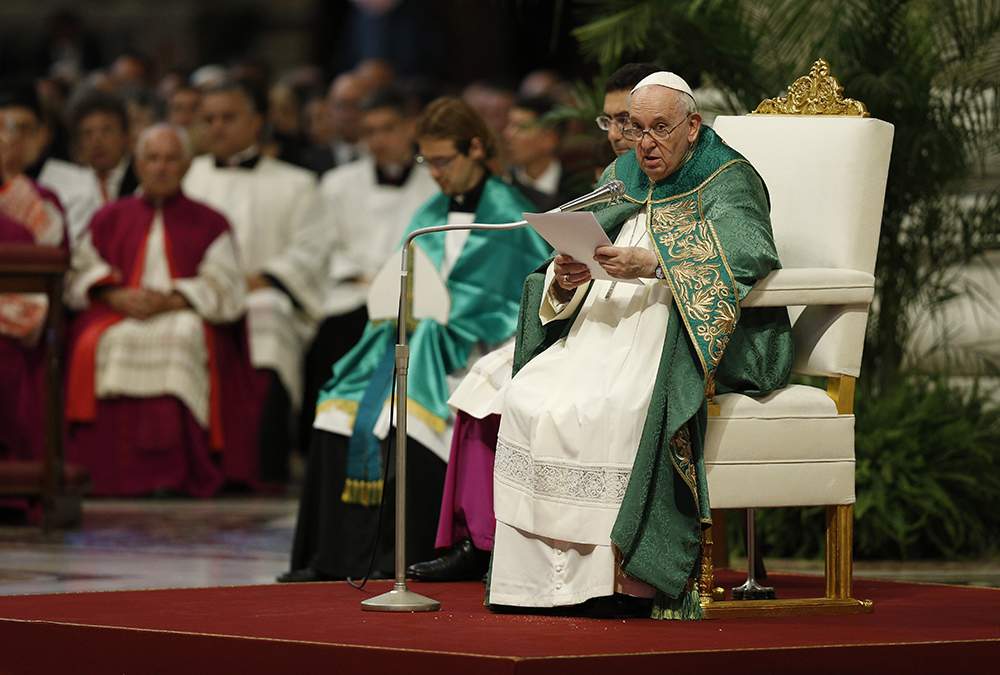
Pope Francis gives the homily during a Mass with new cardinals in St. Peter's Basilica Aug. 30 at the Vatican. (CNS/Paul Haring)
While an official communique at the end of Pope Francis' Aug. 29-30 meeting with the world's Catholic cardinals only said that participants "freely discussed many aspects," participants told NCR that discussions centered around the extent to which lay individuals can be granted authority in church governance, term limits for Vatican officials, and the city-state's finances.
While the gathering took place behind closed doors, participants from four different continents said in interviews that much of the meeting took place in small group discussions, similar to the format used at Vatican meetings of the Synod of Bishops. That and other information was confirmed to NCR by at least two sources who attended the meeting.
The formal list of participants, which was also obtained by NCR, included 197 listed participants, including cardinals, patriarchs and officials from the Vatican's Secretariat of State.
Participants were divided into a total of 12 language groups (four in English, four in Italian, two in French and two in Spanish), with U.S. cardinals Timothy Dolan of New York and Wilton Gregory of Washington serving as spokespersons for two of the English-language groups.
According to the accounts of those interviewed, the pope encouraged all participants to speak from the heart.
Francis said that the Vatican's new apostolic constitution, Praedicate Evangelium, which reorganized the Vatican's central bureaucracy, was the result of discussions with the various Vatican offices. Leading the process was the pope's Council of Cardinals, which was first created by Francis in 2013 and has met about quarterly since then, with many of the reforms being implemented gradually over the last nine years.
At the outset of the meeting, Francis told the cardinals to speak from the heart as they discussed the new constitution, which officially took effect on June 5.
One major change of the new constitution is to explicitly state that "any member of the faithful" can lead most Vatican offices. The previous constitution, Pope John Paul II's 1988 document Pastor Bonus, stated that the major Vatican offices were to be headed by a "cardinal prefect or the presiding archbishop."
Participants at the cardinals' meeting noted that a substantial amount of time was dedicated to this change, including discussion about specifically which Vatican offices might be led by a layperson.
The noted Jesuit canonist and newly created Cardinal Gianfranco Ghirlanda had previously told reporters following the release of the new constitution that the "power of governance in the church does not come from the Sacrament of [Holy] Orders," meaning ordination, but instead, from "canonical mission."
In July, Canadian Cardinal Marc Ouellet published a reflection in the Vatican's daily newspaper, L'Osservatore Romano, which examined historical precedents for separating jurisdiction, or authority within the church, from the sacrament of Holy Orders.
"What founds the inseparable unity of the power of order and jurisdiction is the figure of the Successor of Peter as head of the college of bishops, who holds in communion with them the highest unity of the power of order and jurisdiction and who can consequently apply its effects across the board in sacramental spheres as in juridical or administrative spheres," Ouellet wrote at the time. "He can also delegate and thus make members of God's people participants in his power of jurisdiction."
Advertisement
According to participants, these writings and comments from Ghirlanda and Ouellet reportedly served as the basis for much of the follow-up discussions on the role of the laity during the meeting.
Questions were also reportedly raised during the proceedings about the constitution's requirement that the heads of each Vatican dicastery are to serve five-year terms, renewable only once.
While some attendees questioned whether an individual would be able to adequately grasp the inner workings of their Vatican office and execute their mandate in such a limited period, others reportedly noted that this was necessary to help keep in check any clerical or careerist mentalities. Others reportedly also advocated for limits in order to encourage global dioceses to not be hesitant in sending priests to serve at the Vatican, out of a fear that they would never return home.
During the second day of meetings, a brief discussion was reportedly held on the ongoing process for the 2021-23 Synod of Bishops and Francis' emphasis on church governance through synodality, which prioritizes greater listening, dialogue and the participation of the laity.
While some participants reportedly argued that the theological concept of synodality has not been sufficiently developed, other bishops defended it as having roots that can be traced to the early church and, more recently, to the 1962-65 Second Vatican Council.
Francis himself reportedly intervened in this discussion to say that the practice of synodality is not a novelty in the life of the church.
Widespread acclaim was also said to have been offered for efforts to clean up the Vatican's finances. Earlier this month, the Vatican made its financial statements public, and, earlier this summer, published new guidelines for all financial investments.
Following the conclusion of the two days of meetings — which marks the first time since 2015 that Francis has convened the College of Cardinals — the pope presided over a Mass with nearly 200 of the college's 226 members in St. Peter's Basilica.
During the Mass, which included the 20 new cardinals created by Francis on Aug. 27, Francis warned against what he described as the temptation to think of themselves as possessing "eminent positions in [the] hierarchy" and viewing their roles in a "worldly" fashion.
To be a minister of the church, Francis said during his homily, is to "wonder before God's plan" and to be in service of the church's mission "wherever and however the Holy Spirit may choose."








